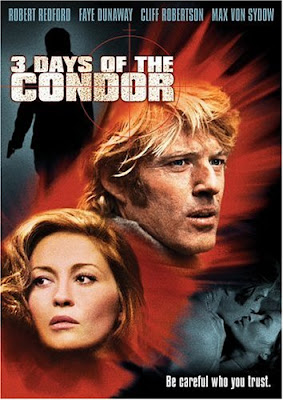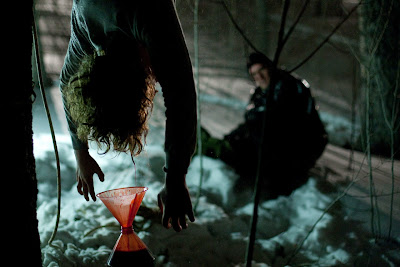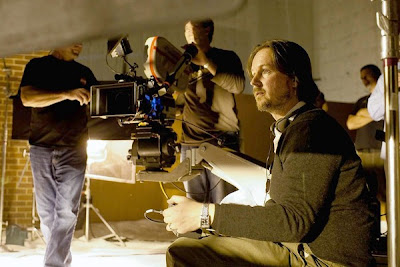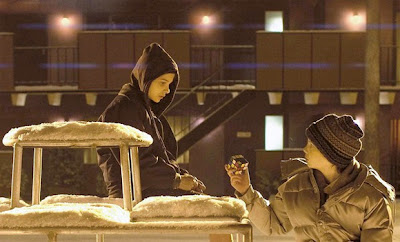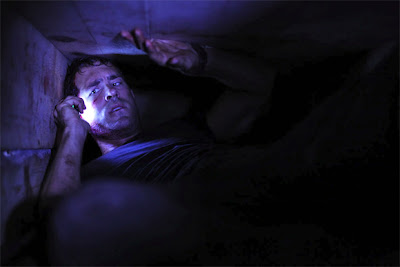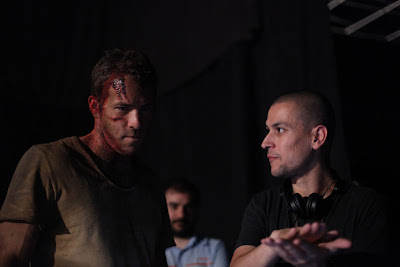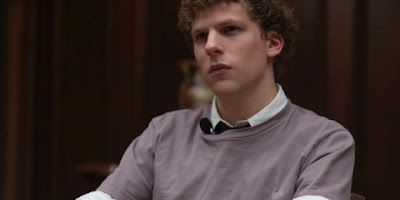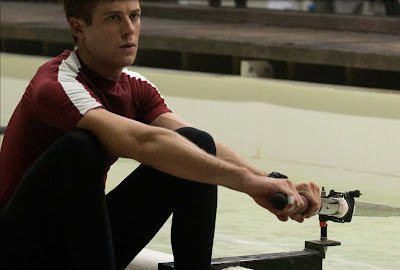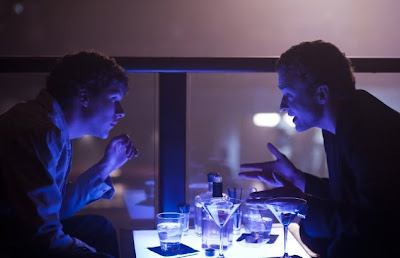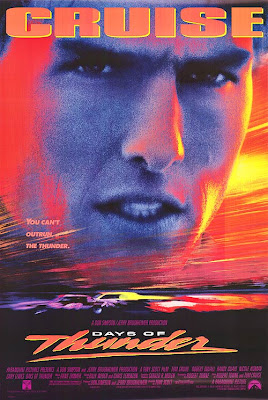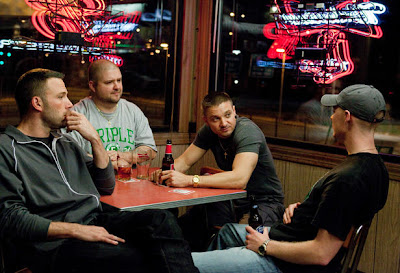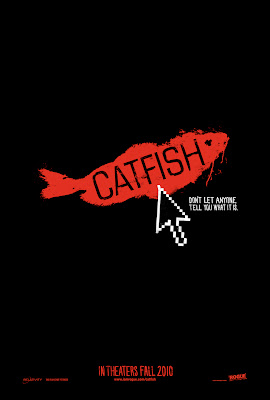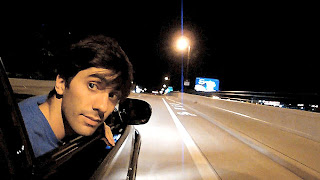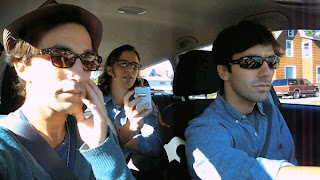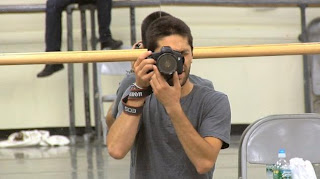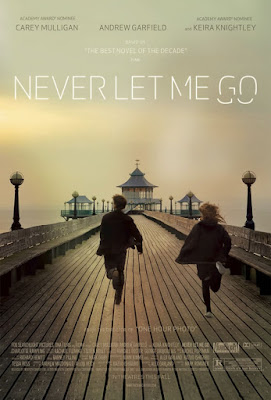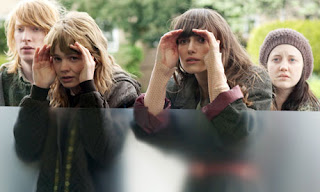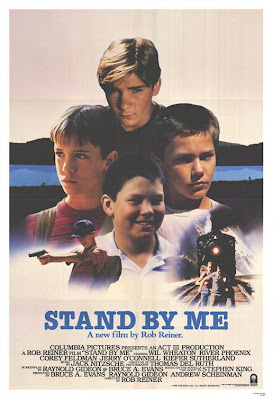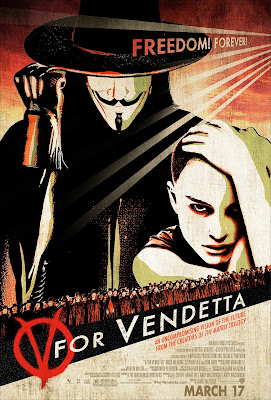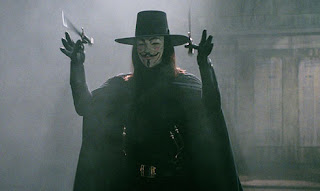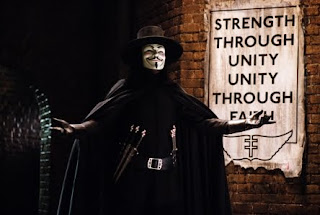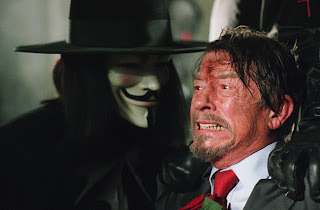In this week's episode, Ben, Pat, and Tyler discuss Sydney Pollack's 1975 film 3 Days of the Condor. Also featured in this episode: a ton of TV talk, since it was premiere week last week.
Monday, September 27, 2010
The NJNM Podcast: Ep. 11 - 3 Days of the Condor
In this week's episode, Ben, Pat, and Tyler discuss Sydney Pollack's 1975 film 3 Days of the Condor. Also featured in this episode: a ton of TV talk, since it was premiere week last week.
Sunday, September 26, 2010
Let Me In
In 2008, Swedish director Tomas Alfredson directed Let the Right One In, a movie based on the best-selling Swedish novel of the same name. The movie won critical acclaim across the world - rightly so, since it's an excellent film - and its international popularity spurred studios to remake it for an English-speaking audience. Matt Reeves (writer and director of Cloverfield) was chosen to take on the challenge of directing the next adaptation. But Reeves was fighting an uphill battle from the start: many fans of the original were displeased with the prospect of a remake, and nearly wrote the movie off before seeing it. So, what's the verdict? Keep reading to find out.
Let Me In
Writer/Director: Matt Reeves
Starring: Chloe Grace Moretz, Kodi Smit-McPhee, Richard Jenkins, Elias Koteas
In my opinion, Let Me In is a totally unnecessary film. That's not to say it's bad - quite the opposite, in fact. I enjoyed the film, and it's a perfectly fine piece of craftsmanship all around. But it bears such a heavy resemblance to Alfredson's 2008 film that I simply don't think it should have been made in the first place. I think the fear of this remake was that in an "Americanized" version, the heart of the original would be lost. I'm happy to report this is not the case - if anything, this movie relies too heavily on Alfredson's vision and just barely offers enough variation on the story to justify its existence.
Set in 1980's New Mexico, the story follows Owen, played by Kodi Smit-McPhee (The Road), a young boy who is savagely bullied at school. He meets Abby, played by Chloe Grace Moretz (Kick-Ass), a strange girl who moves into his apartment complex. As the two strike up a friendship, it becomes clear to Owen that Abby is actually a vampire. She has a caretaker, played by Richard Jenkins (The Visitor), who is tasked with killing people to provide blood for her, and much of the drama comes from watching these scenarios unfold. Elias Koteas (Teenage Mutant Ninja Turtles) plays a policeman trying to solve the murders.
The film does many things right, providing an eerie darkness to the wintry setting and capturing the viciousness of bullying in a school environment. The performances are all very good - the kids in particular deliver some striking work, forcing me to question my usual "I despise kids in movies" mantra. Reeves made a much darker movie with Let Me In, not as quiet and contemplative as the original, but still capturing the essence of what made that movie great. Key scenes (like one that takes place in a pool) are preserved in their entirety and not dumbed down or altered for the mainstream.
Reeves attempts to apply his own stamp to the film, and while I don't think he truly accomplished that goal, he certainly added improving elements along the way. There was an impressive car crash sequence that wasn't featured in the original (reminiscent of the only good part of Terminator Salvation). He also succeeds in giving the movie a nice sense of atmosphere, especially when it comes to the the isolation Owen feels during his parents' divorce (his mother's face is never completely visible, for example). The cinematography was haunting and beautiful, starting with an opening shot of ambulances travelling through the New Mexico landscape in an homage to Sergio Leone's A Fistful of Dollars. There's also a really great shot late in the movie of Owen peering through a frosty window at an empty playground after he witnesses something horrifying; it's a fantastic visual representation of innocence lost.
If I were to nitpick an aspect of the film, it would be the CGI employed during Moretz's vampire sequences. It takes you out of the story a bit, seeing her move in ways that humans can't. The original succeeded because it grounded that character in a quasi-reality, using mostly practical effects and not relying on crazy visuals to get the same effect. There was another sequence - I won't give it away, I'll only say it involves fire - that was also much more effective in the original than in this one because of an over-reliance on CGI in the latter. (To the film's credit, though, Let Me In wisely excised a ridiculous CGI cat sequence from Let the Right One In.)
I apologize for continually comparing this movie to the original, but aside from our natural human instinct for comparison in these situations, this case is even more difficult because they are so incredibly similar throughout. Ultimately, I think Let Me In will serve exactly the purpose that the studio intended: to expose this story to a wider audience in an English capacity. And that's totally fine, since Let Me In is a really solid movie. I just wish more people would seek out Let the Right One In since it essentially "did it first" and it truly is almost the same movie except with subtitles. Until next time...
Saturday, September 25, 2010
New Pokémon Trailer
By Guest Contributor Alan Trehern
But at one time, this lame excuse for children's entertainment took the world by storm. It had a mad following, almost as much as your boy Trehern does! And this trailer, from what I can tell, was made by those same kids that watched the cartoon in the late 1990s.
The actors in this piece are by far the cheesiest I've seen in fan-made cinema. But they bring the whole thing together with the hot red-head and the guy that constantly keeps his eyes closed (get it, cause he's Asian?...some people are just plain racist.) The sound effects are pretty dank, as is the epic music. Add epic music to anything you put on YouTube, and I guarantee you get an average 3.7 million more views than without any epic music.
The computer generated characters must have taken months to create and render, and I only say that because there is no way the producers of this trailer got paid in any capacity. Meaning they did this on their spare time, presumably. Sucks for them. But the time and effort needed to make a high-class product like this parallels a full-time job, so I tip my hat to these guys...you know, if I was wearing a hat.
But enough about bad Japanime-turned Nolan-esque movie trailers. Check out the trailer above, and then check out the NJNM discussion on the trailer in this week's episode: Three Days of the Condor.
Peace out, ass-clowns.
Wednesday, September 22, 2010
Buried
Buried was the hottest property at the Sundance Film Festival this year, earning critical praise and sparking a bidding war between studios (Lionsgate eventually came away victorious). The premise alone had me hooked - a man wakes up buried underground in a coffin with no knowledge of how he got there - and adding Ryan Reynolds to the mix certainly helped pique my interest. But what fascinated me most was the choice director Rodrigo Cortes made regarding how to shoot this film: he decided to film the entire movie inside the coffin, locking the audience in with the character and taking on the challenge of making a compelling film in literally one location.
Buried
Director: Rodrigo Cortes
Starring: Ryan Reynolds
So did Cortes succeed in creating an interesting movie set entirely inside a coffin? Absolutely. Aided by an inventive script by Chris Sparling, Cortes managed to make a Hitchcockian thriller that remains utterly riveting from the nifty opening credits sequence until the final shot of the film. Locked in the coffin with only a phone and a lighter, truck driver Paul Conroy (Reynolds) is - in perhaps the movie's one fatal flaw - able to use his phone underground. Through his conversations, we slowly discover the extent of his problem and piece together information that progresses the story and keeps the audience intrigued and involved.
Buried is quite literally a one-man show, since Ryan Reynolds is the only actor seen on screen for the duration of the movie. He has phone conversations with a few supporting characters (played by the likes of Stephen Tobolowsky and some others), but the responsibility for carrying this film lies squarely on Reynolds' shoulders. To say he rises to the challenge is an understatement, an insult to one of the most captivating performances in recent memory. Reynolds unquestionably commands every scene in this film, earning our trust and empathy seemingly without trying. We feel every labored breath, grimace with every injury, and our emotions rise and fall with his as we listen in on various phone calls that lead toward the film's conclusion. This is an awards-worthy performance, and comparisons to Tom Hanks in Castaway are not unwarranted.
Eduard Grau, the Director of Photography, impressively only utilized light sources that made sense to the story, contributing a great deal to the film's realism. This is especially relevant considering the movie plays out almost in real time - there are a few fades to black to allow for some lapses here and there, but for the most part, we're right in there with Conroy for every second. With the natural light sources shown in essentially real time, the immediacy of the movie heightens our senses and we can't help but sympathize with his horrific scenario. We're wondering what's in each corner of the coffin, but, like Conroy himself, we're kept in the dark until his lighter illuminates the areas around him. I also assumed the selection of camera angles would quickly get repetitive and stale: not the case. Grau and Cortes evolve their shooting style to reflect Conroy's emotions, providing shots I didn't think were possible and never once causing a modicum of boredom.
Aside from the technical achievements and Reynolds' performance, the most impressive aspects of the movie were the action scenes. Yes, you read that correctly - there are multiple action sequences that take place inside the coffin, one of which caused audible gasps throughout the theater. The suspense Cortes is able to create is palpable, and I'm really looking forward to seeing what he does next in Hollywood (or otherwise).
Sparling should be given much of the credit for the effectiveness of the film, and infuses some political commentary into his script. I'd rather not give anything away, but check out for some hints into the plot. There is also a chilling indictment of corporate self-interest, so there's a bit more than meets the eye when it comes to this story. Sparling is sure to be one of the big-name screenwriters in Hollywood upon this film's wide release, and already has a new minimalistic thriller in pre-production called ATM.
With Ryan Reynolds' powerhouse performance leading the charge, Buried is one of the most memorable movie-going experiences I've had in a long time. The ending will almost certainly inspire debate about the film's overall quality, but even if you aren't a fan of the final few shots (I'm still undecided), the impact of this film can't be denied. Until next time...
Buried
Director: Rodrigo Cortes
Starring: Ryan Reynolds
So did Cortes succeed in creating an interesting movie set entirely inside a coffin? Absolutely. Aided by an inventive script by Chris Sparling, Cortes managed to make a Hitchcockian thriller that remains utterly riveting from the nifty opening credits sequence until the final shot of the film. Locked in the coffin with only a phone and a lighter, truck driver Paul Conroy (Reynolds) is - in perhaps the movie's one fatal flaw - able to use his phone underground. Through his conversations, we slowly discover the extent of his problem and piece together information that progresses the story and keeps the audience intrigued and involved.
Buried is quite literally a one-man show, since Ryan Reynolds is the only actor seen on screen for the duration of the movie. He has phone conversations with a few supporting characters (played by the likes of Stephen Tobolowsky and some others), but the responsibility for carrying this film lies squarely on Reynolds' shoulders. To say he rises to the challenge is an understatement, an insult to one of the most captivating performances in recent memory. Reynolds unquestionably commands every scene in this film, earning our trust and empathy seemingly without trying. We feel every labored breath, grimace with every injury, and our emotions rise and fall with his as we listen in on various phone calls that lead toward the film's conclusion. This is an awards-worthy performance, and comparisons to Tom Hanks in Castaway are not unwarranted.
Eduard Grau, the Director of Photography, impressively only utilized light sources that made sense to the story, contributing a great deal to the film's realism. This is especially relevant considering the movie plays out almost in real time - there are a few fades to black to allow for some lapses here and there, but for the most part, we're right in there with Conroy for every second. With the natural light sources shown in essentially real time, the immediacy of the movie heightens our senses and we can't help but sympathize with his horrific scenario. We're wondering what's in each corner of the coffin, but, like Conroy himself, we're kept in the dark until his lighter illuminates the areas around him. I also assumed the selection of camera angles would quickly get repetitive and stale: not the case. Grau and Cortes evolve their shooting style to reflect Conroy's emotions, providing shots I didn't think were possible and never once causing a modicum of boredom.
Aside from the technical achievements and Reynolds' performance, the most impressive aspects of the movie were the action scenes. Yes, you read that correctly - there are multiple action sequences that take place inside the coffin, one of which caused audible gasps throughout the theater. The suspense Cortes is able to create is palpable, and I'm really looking forward to seeing what he does next in Hollywood (or otherwise).
Sparling should be given much of the credit for the effectiveness of the film, and infuses some political commentary into his script. I'd rather not give anything away, but check out for some hints into the plot. There is also a chilling indictment of corporate self-interest, so there's a bit more than meets the eye when it comes to this story. Sparling is sure to be one of the big-name screenwriters in Hollywood upon this film's wide release, and already has a new minimalistic thriller in pre-production called ATM.
With Ryan Reynolds' powerhouse performance leading the charge, Buried is one of the most memorable movie-going experiences I've had in a long time. The ending will almost certainly inspire debate about the film's overall quality, but even if you aren't a fan of the final few shots (I'm still undecided), the impact of this film can't be denied. Until next time...
Tuesday, September 21, 2010
The Social Network
When I first heard whispers of a Facebook movie going into development, I couldn't have been more disinterested. I'm not terribly familiar with Aaron Sorkin's work outside of A Few Good Men and Malice, and though David Fincher has directed some solid movies (The Game, Se7en), he's never been one of my favorite filmmakers. But after seeing and finally seeing the film, I can promise you this is not an eye roll-inducing "trying too hard" desperation stab at cultural relevancy. It's not a "too soon" effort to capitalize on the popularity of Facebook, and it's not a boring movie that's merely about the creation of the site itself. Then what is it? The Social Network is a damn good movie that borders on brilliant.
The Social Network
Director: David Fincher
Starring: Jesse Eisenberg, Andrew Garfield, Justin Timberlake
The film's opening scene features rapid-fire dialogue that begins even before the Columbia logo fades from the screen and continues for a solid five minutes without stopping. The two characters, Mark Zuckerberg (Eisenberg) and his girlfriend Erica* (Rooney Mara) are constantly questioning each other and their place in the conversation since they each move past elements so quickly it's impossible for the other to keep up. But this scene isn't written for the gimmick of having fast-talking young actors sitting across from each other (Diablo Cody, take note). It's a microcosm of one of the film's many themes: members of the "I want it now" generation can quickly and easily get themselves into trouble by speaking too quickly without thinking, and, while undoubtedly stylized beyond a certain level of realism, this scene presents that idea as it simultaneously sets up the personality of our apparent protagonist.
This "blog first, ask questions later" mentality is touched upon (and frowned upon) many times in the movie, which also deals with some larger issues like where the line is drawn for intellectual property theft, corporate ethics, and the personal conflicts that arise when friends are in business together. Fincher himself jokingly referred to the film as "the Citizen Kane of John Hughes movies," but there have been some people who have taken that phrase to heart, actually comparing The Social Network to the movie widely considered the greatest film ever made. (I even at this notion before seeing the film.) But it's possible I was too rash with that dismissal; after seeing the movie, it might be safe to call The Social Network the Citizen Kane for the modern generation. Structurally, the film takes elements from Kane, including a great flashback framing device involving Zuckerberg being sued by two separate plaintiffs at the same time, as well as the more simple plot component of charting the rise and fall of a wealthy young entrepreneur. There's also a bit of a "Rosebud" feel to the ending, which I won't get into here.
Based on Ben Mezrich's book "The Accidental Billionaires," The Social Network obviously takes some liberties with the supposed real life portrayals of situations, people, and events. That brings up an entirely different set of questions, mostly regarding how ethical it is to craft a film that portrays its lead character - a real person still living and working, mind you - in a less-than-flattering light and passing it off as potentially more fact than fiction. I will cry no tears for the real life Zuckerberg as he basks in his billionaire status, but if I were him I wouldn't be thrilled with my on-screen portrayal.
Regardless, Sorkin and Fincher have taken a story that involves a lot of seemingly boring things - computer coding, general nerdiness, and corporate business - and flipped it into a compelling drama that plays at breakneck speed. There is so much more weight to this story than similar internet "rise and fall" films; the 2008 Josh Hartnett vehicle August is a good example of a movie that attempts to capture the same importance that The Social Network provides, but, because the latter makes it look so easy, ultimately fails in comparison.
Jesse Eisenberg, an actor many have dubbed the poor man's Michael Cera, delivers a star-making performance as Zuckerberg, the egotistical creator - and alleged thief - of Facebook. I think the Cera comparisons can stop here: I've never seen Cera give this level of dramatic performance, and I think Eisenberg clearly steps out of that "awkward guy" shadow and into a spotlight all his own. He dominates every scene with the lawyers, vocally destroying one who questions if Mark has "his full attention." It'll be interesting to see Eisenberg return to comedy after this, since he absolutely destroys this performance; if we compare his career to that of another actor, I'd say this might be his equivalent to The Truman Show.
Andrew Garfield also did some spectacular work as Eduardo Saverin, Mark's partner and CFO of Facebook. Indeed, rumor has it Garfield was chosen as the next Spider-Man based on his work in The Social Network. In any case, he was remarkably different from his quiet performance in Never Let Me Go, and I much preferred his character here. And while I won't claim to have been preaching from the Gospel of Timberlake since the beginning, I will say that ever since 2006's Alpha Dog, I've considered Justin Timberlake a quality actor. This is easily his best role, and he injects the character of Sean Parker (the creator of Napster) with a confidence heretofore unseen in his filmography.
One other thing regarding the acting: the final credits listed Armie Hammer (formerly cast as Batman in George Miller's abandoned Justice League movie) as playing both Cameron and Tyler Winklevoss, brothers who are one of the parties suing Zuckerberg for intellectual theft. If this is true, then hats off to Mr. Hammer for fantastic dueling performances and even more congratulations to the filmmakers for pulling off an absolutely seamless transition throughout the duration of the movie. Josh Pence plays Tyler Winklevoss, but I remember the credits giving Hammer credit and recently that with a friend of mine.
In Catfish, I wondered if that film might actually be more about Facebook than The Social Network. Both movies clearly speak to our connectivity in different ways: Facebook was used more as a tool in Catfish, reflecting real world applications for the site, and The Social Network arranges it as an empire with idealistic goals, posturing the site itself as an exclusive club much like the ones which Zuckerberg yearns to be invited.
The addition of Sean Parker to the mix adds another level of complexity to the film. Best friends Eduardo and Mark clash over how to capitalize on the overnight success of the site, and Parker's flashy ways ultimately contribute to Mark and Eduardo's deteriorating relationship. Zuckerberg is smitten with Parker's business tactics, and Eduardo and his nose-to-the-grindstone methods to secure advertising are (spoiler alert for real life) slowly edged out in favor of the brazen antics of the former Napster wonderboy.
The Social Network is the kind of film in which you know you're witnessing something special as it unfolds before you. It's not breathtaking in the same way as this summer's Inception, but in a much more subtle manner - the writing, direction, acting, and music (a solid score by Trent Reznor and Atticus Ross) come together to tell an allegedly true story of something that has a tactile effect on our daily lives. I hesitate to throw around the term "masterpiece" since it devalues the term if every 20th movie is a masterpiece, but the more I think about it, the more this film actually applies to that definition. It's easily my favorite Fincher movie, and assuredly pulls triple duty as a coming-of-age story, a biographical time capsule, and an outstanding courtroom drama that never actually enters a courtroom. The Social Network is a must-see for members of the Facebook generation. Until next time...
*Rooney Mara won the hotly-contested role of Lisbeth Salander in the English language remake of The Girl with the Dragon Tattoo, beating out the likes of Natalie Portman, Ellen Page, and many more. Fincher is also directing that project, which is filming now, and seemingly cast Mara based on her work in The Social Network. I'm not entirely sure what he saw in her as Lisbeth Salander, because it's not entirely clear from her work in this film that she's a good fit for the character. Maybe he saw something that we didn't. Guess we'll have to wait to find out.
The Social Network
Director: David Fincher
Starring: Jesse Eisenberg, Andrew Garfield, Justin Timberlake
The film's opening scene features rapid-fire dialogue that begins even before the Columbia logo fades from the screen and continues for a solid five minutes without stopping. The two characters, Mark Zuckerberg (Eisenberg) and his girlfriend Erica* (Rooney Mara) are constantly questioning each other and their place in the conversation since they each move past elements so quickly it's impossible for the other to keep up. But this scene isn't written for the gimmick of having fast-talking young actors sitting across from each other (Diablo Cody, take note). It's a microcosm of one of the film's many themes: members of the "I want it now" generation can quickly and easily get themselves into trouble by speaking too quickly without thinking, and, while undoubtedly stylized beyond a certain level of realism, this scene presents that idea as it simultaneously sets up the personality of our apparent protagonist.
This "blog first, ask questions later" mentality is touched upon (and frowned upon) many times in the movie, which also deals with some larger issues like where the line is drawn for intellectual property theft, corporate ethics, and the personal conflicts that arise when friends are in business together. Fincher himself jokingly referred to the film as "the Citizen Kane of John Hughes movies," but there have been some people who have taken that phrase to heart, actually comparing The Social Network to the movie widely considered the greatest film ever made. (I even at this notion before seeing the film.) But it's possible I was too rash with that dismissal; after seeing the movie, it might be safe to call The Social Network the Citizen Kane for the modern generation. Structurally, the film takes elements from Kane, including a great flashback framing device involving Zuckerberg being sued by two separate plaintiffs at the same time, as well as the more simple plot component of charting the rise and fall of a wealthy young entrepreneur. There's also a bit of a "Rosebud" feel to the ending, which I won't get into here.
Based on Ben Mezrich's book "The Accidental Billionaires," The Social Network obviously takes some liberties with the supposed real life portrayals of situations, people, and events. That brings up an entirely different set of questions, mostly regarding how ethical it is to craft a film that portrays its lead character - a real person still living and working, mind you - in a less-than-flattering light and passing it off as potentially more fact than fiction. I will cry no tears for the real life Zuckerberg as he basks in his billionaire status, but if I were him I wouldn't be thrilled with my on-screen portrayal.
Regardless, Sorkin and Fincher have taken a story that involves a lot of seemingly boring things - computer coding, general nerdiness, and corporate business - and flipped it into a compelling drama that plays at breakneck speed. There is so much more weight to this story than similar internet "rise and fall" films; the 2008 Josh Hartnett vehicle August is a good example of a movie that attempts to capture the same importance that The Social Network provides, but, because the latter makes it look so easy, ultimately fails in comparison.
Jesse Eisenberg, an actor many have dubbed the poor man's Michael Cera, delivers a star-making performance as Zuckerberg, the egotistical creator - and alleged thief - of Facebook. I think the Cera comparisons can stop here: I've never seen Cera give this level of dramatic performance, and I think Eisenberg clearly steps out of that "awkward guy" shadow and into a spotlight all his own. He dominates every scene with the lawyers, vocally destroying one who questions if Mark has "his full attention." It'll be interesting to see Eisenberg return to comedy after this, since he absolutely destroys this performance; if we compare his career to that of another actor, I'd say this might be his equivalent to The Truman Show.
Andrew Garfield also did some spectacular work as Eduardo Saverin, Mark's partner and CFO of Facebook. Indeed, rumor has it Garfield was chosen as the next Spider-Man based on his work in The Social Network. In any case, he was remarkably different from his quiet performance in Never Let Me Go, and I much preferred his character here. And while I won't claim to have been preaching from the Gospel of Timberlake since the beginning, I will say that ever since 2006's Alpha Dog, I've considered Justin Timberlake a quality actor. This is easily his best role, and he injects the character of Sean Parker (the creator of Napster) with a confidence heretofore unseen in his filmography.
One other thing regarding the acting: the final credits listed Armie Hammer (formerly cast as Batman in George Miller's abandoned Justice League movie) as playing both Cameron and Tyler Winklevoss, brothers who are one of the parties suing Zuckerberg for intellectual theft. If this is true, then hats off to Mr. Hammer for fantastic dueling performances and even more congratulations to the filmmakers for pulling off an absolutely seamless transition throughout the duration of the movie. Josh Pence plays Tyler Winklevoss, but I remember the credits giving Hammer credit and recently that with a friend of mine.
In Catfish, I wondered if that film might actually be more about Facebook than The Social Network. Both movies clearly speak to our connectivity in different ways: Facebook was used more as a tool in Catfish, reflecting real world applications for the site, and The Social Network arranges it as an empire with idealistic goals, posturing the site itself as an exclusive club much like the ones which Zuckerberg yearns to be invited.
The addition of Sean Parker to the mix adds another level of complexity to the film. Best friends Eduardo and Mark clash over how to capitalize on the overnight success of the site, and Parker's flashy ways ultimately contribute to Mark and Eduardo's deteriorating relationship. Zuckerberg is smitten with Parker's business tactics, and Eduardo and his nose-to-the-grindstone methods to secure advertising are (spoiler alert for real life) slowly edged out in favor of the brazen antics of the former Napster wonderboy.
The Social Network is the kind of film in which you know you're witnessing something special as it unfolds before you. It's not breathtaking in the same way as this summer's Inception, but in a much more subtle manner - the writing, direction, acting, and music (a solid score by Trent Reznor and Atticus Ross) come together to tell an allegedly true story of something that has a tactile effect on our daily lives. I hesitate to throw around the term "masterpiece" since it devalues the term if every 20th movie is a masterpiece, but the more I think about it, the more this film actually applies to that definition. It's easily my favorite Fincher movie, and assuredly pulls triple duty as a coming-of-age story, a biographical time capsule, and an outstanding courtroom drama that never actually enters a courtroom. The Social Network is a must-see for members of the Facebook generation. Until next time...
*Rooney Mara won the hotly-contested role of Lisbeth Salander in the English language remake of The Girl with the Dragon Tattoo, beating out the likes of Natalie Portman, Ellen Page, and many more. Fincher is also directing that project, which is filming now, and seemingly cast Mara based on her work in The Social Network. I'm not entirely sure what he saw in her as Lisbeth Salander, because it's not entirely clear from her work in this film that she's a good fit for the character. Maybe he saw something that we didn't. Guess we'll have to wait to find out.
Monday, September 20, 2010
The NJNM Podcast: Ep. 10 - Top Gun and Days of Thunder
In this week's episode, Ben, Tyler, and Pat discuss a pair of Tony Scott films, both of which star Tom Cruise: Top Gun and Days of Thunder.
Friday, September 17, 2010
The Town
Ben Affleck's second directorial feature is a solid piece of work. It probably won't change anyone's life, and it's certainly not as good as some of its Boston-set contemporaries, but The Town further establishes Affleck's credibility both behind and in front of the camera. Comparisons to Clint Eastwood will surely pop up across the web (indeed, they already have), and - as much as I love Eastwood - I actually don't think those comparisons are unwarranted.
The Town
Co-Writer/Director: Ben Affleck
Starring: Ben Affleck, Jeremy Renner, Jon Hamm, Rebecca Hall, Blake Lively
Following 2007's Gone Baby Gone, Affleck returns to the city in which he grew up to tell this story, adapted from Chuck Hogan's novel "Prince of Thieves." He plays Doug MacRay, a thief who orchestrates the robberies. One thing he didn't count on was meeting Claire Keesey (Hall), the manager at the latest bank he and his boys rob. After they take Claire hostage and eventually release her, Doug checks in to see if Claire can identify them, falling for her in the process. MacRay's number two guy is James "Jem" Coughlin (Renner), a thug with a thirst for violence and a rampant criminal history. FBI Agent Adam Frawley (Hamm) is tracking their every move, waiting for one mistake so he can take these guys down.
The movie doesn't break new ground in any aspect; we've seen this all before. But like the 2008 police thriller Pride and Glory with Colin Farrell and Edward Norton, sometimes it doesn't matter if you've seen the elements before - the fun comes with watching these specific actors pull it off. And pull it off they do - Affleck himself does some good work as the conflicted robber with a conscience, and Renner stands out as the wild-eyed ex-con who will do whatever it takes to avoid returning to prison. (His intensity recalled Ben Foster's character in 2007's 3:10 to Yuma.) Jon Hamm eschews his Don Draper persona in favor of a foul-mouthed agent (sorry bro, Wahlberg did it better in '06), and Hall was excellent in more of a leading role than she's used to playing. I didn't quite understand the reason for all of the buzz behind Blake Lively's performance as a drug-addled hooker; she was passable, but this was far from a star-building turn for the young actress.
Multiple bank robberies and car chases are definite highlights of the film, showing flashes of Grand Theft Auto and The Dark Knight. Affleck infuses these scenes with a sense of kinetic immediacy that allows us to feel the repercussions of each shot fired, channeling Michael Mann from both Heat and Public Enemies. There are also shades of Point Break, with the gang donning various masks and costumes to pull their bank jobs.
It's hard to write extensively about this film since it doesn't really contribute anything new or especially interesting to the genre. But don't hold that against it - The Town is entertaining, exciting, filled with solid performances, funny at some points, and charming at others. In an age where "marketing" has become a dirty word and is seemingly used more often than not to trick audiences into seeing a movie, this film steps up and delivers exactly what you'd expect after seeing its trailer - and that's not a bad thing at all. Until next time...
The Town
Co-Writer/Director: Ben Affleck
Starring: Ben Affleck, Jeremy Renner, Jon Hamm, Rebecca Hall, Blake Lively
Following 2007's Gone Baby Gone, Affleck returns to the city in which he grew up to tell this story, adapted from Chuck Hogan's novel "Prince of Thieves." He plays Doug MacRay, a thief who orchestrates the robberies. One thing he didn't count on was meeting Claire Keesey (Hall), the manager at the latest bank he and his boys rob. After they take Claire hostage and eventually release her, Doug checks in to see if Claire can identify them, falling for her in the process. MacRay's number two guy is James "Jem" Coughlin (Renner), a thug with a thirst for violence and a rampant criminal history. FBI Agent Adam Frawley (Hamm) is tracking their every move, waiting for one mistake so he can take these guys down.
The movie doesn't break new ground in any aspect; we've seen this all before. But like the 2008 police thriller Pride and Glory with Colin Farrell and Edward Norton, sometimes it doesn't matter if you've seen the elements before - the fun comes with watching these specific actors pull it off. And pull it off they do - Affleck himself does some good work as the conflicted robber with a conscience, and Renner stands out as the wild-eyed ex-con who will do whatever it takes to avoid returning to prison. (His intensity recalled Ben Foster's character in 2007's 3:10 to Yuma.) Jon Hamm eschews his Don Draper persona in favor of a foul-mouthed agent (sorry bro, Wahlberg did it better in '06), and Hall was excellent in more of a leading role than she's used to playing. I didn't quite understand the reason for all of the buzz behind Blake Lively's performance as a drug-addled hooker; she was passable, but this was far from a star-building turn for the young actress.
Multiple bank robberies and car chases are definite highlights of the film, showing flashes of Grand Theft Auto and The Dark Knight. Affleck infuses these scenes with a sense of kinetic immediacy that allows us to feel the repercussions of each shot fired, channeling Michael Mann from both Heat and Public Enemies. There are also shades of Point Break, with the gang donning various masks and costumes to pull their bank jobs.
It's hard to write extensively about this film since it doesn't really contribute anything new or especially interesting to the genre. But don't hold that against it - The Town is entertaining, exciting, filled with solid performances, funny at some points, and charming at others. In an age where "marketing" has become a dirty word and is seemingly used more often than not to trick audiences into seeing a movie, this film steps up and delivers exactly what you'd expect after seeing its trailer - and that's not a bad thing at all. Until next time...
Thursday, September 16, 2010
Catfish
I'll start by saying that I recommend this film to everyone. But believe the hype: Catfish is more than a movie; it's a true cinematic experience that shouldn't be tarnished by knowing any information about it before you embark on the film's journey. I knew nothing about it going in (no actors, no genre, nada), and I can guarantee that's the best approach to take here. Avoid the trailers, don't read a plot synopsis, and certainly don't read this review - go see the movie and then come back. Take your time - I'll wait.
Catfish
Directors: Ariel Schulman and Henry Joost
Starring: Yaniv "Nev" Schulman
[Seriously - if you haven't seen the movie, don't read this. You'll only ruin it for yourself. So, assuming you've seen the movie, consider the rest of the review spoiler-heavy.]
The most important question this film poses is not "were those events fabricated?" but rather "does it matter if they were fabricated?" There are doubts all across the internet about the credibility of Catfish as a straightforward documentary - I must admit, one of the first things I questioned after leaving the theater was how much of it was real - but after taking a step back, I think the film stands on its own regardless of its veracity.
The film took me on an emotional ride like very few movies have, and I'm grateful for the experience. Rel and Henry, the documentarians, do a fantastic job of providing a sense of intimacy with the audience, and Nev's affable nature and willingness to interact with the camera really helps to build a comfortable relationship with us. He's such a likable protagonist; it's nearly impossible not to feel for him as he undergoes this incredible discovery. The scene in which he reads a text exchange between him and Megan is so genuinely funny (and seemingly real) that it instantly puts us even further in Nev's camp. And I was genuinely worried for him during a scene in which they visit her barn at night. I don't remember if there was a subtle music change during that sequence or if they cut the music out of that scene altogether; either way, it was very effective and had me clenching the armrests in the theater, preparing for the worst.
It's interesting that Catfish nearly coincides with the release of David Fincher's The Social Network, a movie detailing the rise of Facebook. I'm wondering if Catfish will actually be more about Facebook than The Social Network; if early trailers are any indication, it would appear the latter might revolve more around betrayals and behind-the-scenes dealings of one of the world's biggest companies, leaving the site in the periphery. But Catfish is undoubtedly about Facebook itself, showcasing the site, and all manner of today's technology - Google, YouTube, etc. - throughout the film: first, as a platform for a budding relationship; second, as an investigative tool used primarily for putting pieces together; and finally, as a tragic playground for empty avatars and shattered promises.
It's the second depiction that's the best part of the movie. When Nev, Rel, and Henry begin to uncover the truth, they utilize technology around them and the pace really picks up. Catfish shifts to a modern day mystery, swapping magnifying glasses and fingerprint dusters for Google Street Views and YouTube searches. As the trio add up more and more details, a suspenseful anxiety washes over the film.
And when the truth is revealed, it hits like a sledgehammer.
Perhaps the most interesting trick Catfish plays is the stylistic choice of using Facebook for identification. Profiles, pictures, comments, hovering mouse arrows revealing people's names - all of these notions are not only called into question but outright negated by the final reveal. If nothing else, this film serves as a time capsule into a generation: a reminder for future societies of how we used connectivity for good and bad, for romance and boredom, for pleasure and escape. It's also a very clear warning to those of us entrenched in this era of tech right now: don't believe everything you read on the internet, and for the love of God - be careful out there.
For the record, I don't think the whole movie was real. I think the filmmakers exploited Angela and her handicapped step-children to a degree, using them (and the rising unease the last act generates) to "prove" to the audience that what we've been seeing all along has been legitimate. There's a great piece at Movieline that details a lot of their doubts, and I agree with most of them. A sequence at the end involving flashbacks to Nev saying certain things - about how Angela's kids are awesome, "at least on Facebook," etc. - struck me as a bit too perfectly orchestrated. Keep in mind, the filmmakers insist that everything is legitimate. My cynical outlook comes from a background working in reality television, where shows portrayed as "real" are most certainly not. I'd be interested to see where you come down on this, but like I said - it honestly doesn't matter if it's real or not because the movie is incredibly effective any way you look at it.
Please don't equate my doubt of the film's ultimate truth with a dislike for the movie. Catfish is a phenomenal experience and provides a piercing look into our generation, calling into question our blind acceptance of social media and allowing us a unique look at some of the people behind the profile pictures. Until next time...
Catfish
Directors: Ariel Schulman and Henry Joost
Starring: Yaniv "Nev" Schulman
[Seriously - if you haven't seen the movie, don't read this. You'll only ruin it for yourself. So, assuming you've seen the movie, consider the rest of the review spoiler-heavy.]
The most important question this film poses is not "were those events fabricated?" but rather "does it matter if they were fabricated?" There are doubts all across the internet about the credibility of Catfish as a straightforward documentary - I must admit, one of the first things I questioned after leaving the theater was how much of it was real - but after taking a step back, I think the film stands on its own regardless of its veracity.
The film took me on an emotional ride like very few movies have, and I'm grateful for the experience. Rel and Henry, the documentarians, do a fantastic job of providing a sense of intimacy with the audience, and Nev's affable nature and willingness to interact with the camera really helps to build a comfortable relationship with us. He's such a likable protagonist; it's nearly impossible not to feel for him as he undergoes this incredible discovery. The scene in which he reads a text exchange between him and Megan is so genuinely funny (and seemingly real) that it instantly puts us even further in Nev's camp. And I was genuinely worried for him during a scene in which they visit her barn at night. I don't remember if there was a subtle music change during that sequence or if they cut the music out of that scene altogether; either way, it was very effective and had me clenching the armrests in the theater, preparing for the worst.
It's interesting that Catfish nearly coincides with the release of David Fincher's The Social Network, a movie detailing the rise of Facebook. I'm wondering if Catfish will actually be more about Facebook than The Social Network; if early trailers are any indication, it would appear the latter might revolve more around betrayals and behind-the-scenes dealings of one of the world's biggest companies, leaving the site in the periphery. But Catfish is undoubtedly about Facebook itself, showcasing the site, and all manner of today's technology - Google, YouTube, etc. - throughout the film: first, as a platform for a budding relationship; second, as an investigative tool used primarily for putting pieces together; and finally, as a tragic playground for empty avatars and shattered promises.
It's the second depiction that's the best part of the movie. When Nev, Rel, and Henry begin to uncover the truth, they utilize technology around them and the pace really picks up. Catfish shifts to a modern day mystery, swapping magnifying glasses and fingerprint dusters for Google Street Views and YouTube searches. As the trio add up more and more details, a suspenseful anxiety washes over the film.
And when the truth is revealed, it hits like a sledgehammer.
Perhaps the most interesting trick Catfish plays is the stylistic choice of using Facebook for identification. Profiles, pictures, comments, hovering mouse arrows revealing people's names - all of these notions are not only called into question but outright negated by the final reveal. If nothing else, this film serves as a time capsule into a generation: a reminder for future societies of how we used connectivity for good and bad, for romance and boredom, for pleasure and escape. It's also a very clear warning to those of us entrenched in this era of tech right now: don't believe everything you read on the internet, and for the love of God - be careful out there.
For the record, I don't think the whole movie was real. I think the filmmakers exploited Angela and her handicapped step-children to a degree, using them (and the rising unease the last act generates) to "prove" to the audience that what we've been seeing all along has been legitimate. There's a great piece at Movieline that details a lot of their doubts, and I agree with most of them. A sequence at the end involving flashbacks to Nev saying certain things - about how Angela's kids are awesome, "at least on Facebook," etc. - struck me as a bit too perfectly orchestrated. Keep in mind, the filmmakers insist that everything is legitimate. My cynical outlook comes from a background working in reality television, where shows portrayed as "real" are most certainly not. I'd be interested to see where you come down on this, but like I said - it honestly doesn't matter if it's real or not because the movie is incredibly effective any way you look at it.
Please don't equate my doubt of the film's ultimate truth with a dislike for the movie. Catfish is a phenomenal experience and provides a piercing look into our generation, calling into question our blind acceptance of social media and allowing us a unique look at some of the people behind the profile pictures. Until next time...
Tuesday, September 14, 2010
Never Let Me Go
Never Let Me Go has been getting rave reviews on the festival circuit; interested to see what all the fuss was about, I jumped at the chance to see an early screening of the movie before its nationwide release on October 8th. While the film showcased some excellent performances from up-and-coming actors, and was a wonderfully well-shot piece of work, I don't think it's something I'll watch again.
Never Let Me Go
Director: Mark Romanek
Starring: Carey Mulligan, Andrew Garfield, Keira Knightley
The film is based on Kazuo Ishiguro's highly acclaimed novel of the same name, which I haven't read. (I'll judge this movie based solely on what I saw on screen, but if you've seen the movie and read the book, feel free to sound off in the comments and let us know about the differences.) Romanek has only directed one feature before this one - the 2002 Robin Williams movie One Hour Photo - but I almost guarantee you've seen his work: he directed Michael and Janet Jackson's "Scream" music video, The Red Hot Chili Peppers' "Can't Stop" video, and Jay-Z's "99 Problems" video, among many others.
The movie basically chronicles a love triangle between three children from an idyllic English boarding school to a college-age work placement community to eventual adulthood. Kathy (Mulligan) is clearly a great match for Tommy (Garfield), but her jealous best friend Ruth (Knightley) steps in and steals him away - leaving Kathy as the third wheel in their trio and forcing her to endure the pain of watching the love of her life spend it with someone else.
(Spoilers in the next paragraph only.)
Never Let Me Go is definitely Oscar bait, a deliberate and slow-moving film that deals with issues of humanity, life, and love that will undoubtedly secure awards nominations in the coming months. The screenplay, by Alex Garland (28 Days Later, Sunshine), is essentially an "indie" version of Michael Bay's 2005 film The Island. Both films feature characters created with the sole purpose of being harvested for their internal organs, and thematically explores some of the same territory. A huge difference between the films, however - style, acting, and basically all elements except plot aside - is how the characters in each film react to the truth when it is finally revealed. In The Island, the characters quickly decide to make a break for it, tearing through the facade of their existence on a quest to find their sponsors and send the system into upheaval. In Romanek's film, the characters blindly accept their fate and don't try to escape from the system at all; instead, they seem content with merely delaying the inevitable.
If there are aspects deserving of praise in this movie, they are the acting of the three leads and their younger counterparts. Carey Mulligan delivers a quietly compelling performance as Kathy H., the protagonist and vehicle which the audience rides through the film. Future Spider-Man Andrew Garfield does some fine work here as well, crafting one of the most tragic characters and - even though he has a "freak-out moment" that seemed particularly desperate for Oscar attention - pushed through that one eye-rolling sequence to a satisfying conclusion. Even Keira Knightley - an actress I'm not particularly fond of - was effective, coming off as especially menacing in "The Cottages" flashback scenes. But I was honestly more impressed with the work of the younger actors who played those characters, most notably the feature film debut of Isobel Meikle-Small, who bears an incredible resemblance to Mulligan and perfectly captured the innocence (and heartbreak) of young love.
I think I would have enjoyed the film more if the story had been more compelling, even on a basic gut level. There just isn't much going on in the narrative - and when another reveal comes late in the third act, the audience has already figured out what's going on and we're waiting for the characters to play catch-up. Sure, the concept of the love triangle between the three leads is interesting to a degree, but at the same time, we've seen that story played out countless times and nothing markedly original is presented in those specific scenes.
Romanek's direction should be praised for cultivating solid portrayals from his entire cast. The world of Never Let Me Go is a futuristic alternate dystopia, but without many drastic alterations or heavy sci-fi elements (hence the Academy's nearly guaranteed approval). I wish Romanek would have gone into a bit more detail exploring the differences between our world and the one depicted on screen, but again - the more this looks like an English boarding-school drama, the better chances it has to win awards. (Yes, that's incredibly cynical, but sadly true.) Some praise him for the atmosphere here, but I'll attribute most of that to Rachel Portman's string-heavy musical score (which, like the camera work in this film, was gorgeous).
There are some comedic moments (which I won't spoil), and some suspenseful ones as well, but overall, the tone of the film is akin to a leisurely walk through a park: non-threatening, occasionally brisk, but mostly just nice to look at. Never Let Me Go is a movie I'm glad I've seen but not one I plan on returning to in the future; the bleak and dreary England portrayed here combined with the depressing story aspects don't make it easy material to love, but rather to appreciate. Until next time...
Never Let Me Go
Director: Mark Romanek
Starring: Carey Mulligan, Andrew Garfield, Keira Knightley
The film is based on Kazuo Ishiguro's highly acclaimed novel of the same name, which I haven't read. (I'll judge this movie based solely on what I saw on screen, but if you've seen the movie and read the book, feel free to sound off in the comments and let us know about the differences.) Romanek has only directed one feature before this one - the 2002 Robin Williams movie One Hour Photo - but I almost guarantee you've seen his work: he directed Michael and Janet Jackson's "Scream" music video, The Red Hot Chili Peppers' "Can't Stop" video, and Jay-Z's "99 Problems" video, among many others.
The movie basically chronicles a love triangle between three children from an idyllic English boarding school to a college-age work placement community to eventual adulthood. Kathy (Mulligan) is clearly a great match for Tommy (Garfield), but her jealous best friend Ruth (Knightley) steps in and steals him away - leaving Kathy as the third wheel in their trio and forcing her to endure the pain of watching the love of her life spend it with someone else.
(Spoilers in the next paragraph only.)
Never Let Me Go is definitely Oscar bait, a deliberate and slow-moving film that deals with issues of humanity, life, and love that will undoubtedly secure awards nominations in the coming months. The screenplay, by Alex Garland (28 Days Later, Sunshine), is essentially an "indie" version of Michael Bay's 2005 film The Island. Both films feature characters created with the sole purpose of being harvested for their internal organs, and thematically explores some of the same territory. A huge difference between the films, however - style, acting, and basically all elements except plot aside - is how the characters in each film react to the truth when it is finally revealed. In The Island, the characters quickly decide to make a break for it, tearing through the facade of their existence on a quest to find their sponsors and send the system into upheaval. In Romanek's film, the characters blindly accept their fate and don't try to escape from the system at all; instead, they seem content with merely delaying the inevitable.
If there are aspects deserving of praise in this movie, they are the acting of the three leads and their younger counterparts. Carey Mulligan delivers a quietly compelling performance as Kathy H., the protagonist and vehicle which the audience rides through the film. Future Spider-Man Andrew Garfield does some fine work here as well, crafting one of the most tragic characters and - even though he has a "freak-out moment" that seemed particularly desperate for Oscar attention - pushed through that one eye-rolling sequence to a satisfying conclusion. Even Keira Knightley - an actress I'm not particularly fond of - was effective, coming off as especially menacing in "The Cottages" flashback scenes. But I was honestly more impressed with the work of the younger actors who played those characters, most notably the feature film debut of Isobel Meikle-Small, who bears an incredible resemblance to Mulligan and perfectly captured the innocence (and heartbreak) of young love.
I think I would have enjoyed the film more if the story had been more compelling, even on a basic gut level. There just isn't much going on in the narrative - and when another reveal comes late in the third act, the audience has already figured out what's going on and we're waiting for the characters to play catch-up. Sure, the concept of the love triangle between the three leads is interesting to a degree, but at the same time, we've seen that story played out countless times and nothing markedly original is presented in those specific scenes.
Romanek's direction should be praised for cultivating solid portrayals from his entire cast. The world of Never Let Me Go is a futuristic alternate dystopia, but without many drastic alterations or heavy sci-fi elements (hence the Academy's nearly guaranteed approval). I wish Romanek would have gone into a bit more detail exploring the differences between our world and the one depicted on screen, but again - the more this looks like an English boarding-school drama, the better chances it has to win awards. (Yes, that's incredibly cynical, but sadly true.) Some praise him for the atmosphere here, but I'll attribute most of that to Rachel Portman's string-heavy musical score (which, like the camera work in this film, was gorgeous).
There are some comedic moments (which I won't spoil), and some suspenseful ones as well, but overall, the tone of the film is akin to a leisurely walk through a park: non-threatening, occasionally brisk, but mostly just nice to look at. Never Let Me Go is a movie I'm glad I've seen but not one I plan on returning to in the future; the bleak and dreary England portrayed here combined with the depressing story aspects don't make it easy material to love, but rather to appreciate. Until next time...
Sunday, September 12, 2010
V For Vendetta
I was shocked to discover I haven't written a single word about V For Vendetta since its release back in 2006. I really, really enjoyed the movie back then, and recently re-watched it with a friend of mine who had never seen it. So consider this my very late review.*
V For Vendetta
Director: James McTeigue
Starring: Natalie Portman, Hugo Weaving, John Hurt, Stephen Rea
Based on Alan Moore's comic book series of the same name, V For Vendetta takes place in a futuristic dystopian United Kingdom ruled by a totalitarian government. As a terrorist known only as "V" (Weaving) sets plans in motion to bring the power back to the people, he saves the young Evey Hammond (Portman), who becomes embroiled in the plot over the course of a year. Simultaneously, two detectives attempt to find V and, in the process, discover the horrifying cause of their country's current state.
(Spoilers throughout.)
As previously stated, I really dug this movie when it first came out. I found it interesting that a film could balance a quasi-superhero movie (with all of the action and slow motion that comes along with that genre) with the notion of "making you think" by presenting all of these political ideas alongside the action conventions. "But that Guy Fawkes poem they kept reciting was really cool, right?" my younger self would have said. Poems, slow motion, and action aside - what is this movie really about? What political notions would it have us consider, and where, as an audience, do we stand in McTeigue's dystopian world?
Let's first try to ascertain who American audiences are supposed to relate to in this film. The movie is set in the United Kingdom, so right away there's a bit of a disconnect. But countless other films have been set overseas and we have no problem realigning our perception and easily using those other locations as metaphorical stand-ins for the United States. In this film, however, there are multiple references to America basically causing the dystopia and the ultimate downfall of modern society. The entire introduction sets up the film's universe by painting America as the nation solely responsible for England's misery, with a concentration on our "Godlessness" and disapproval of homosexuality as the stepping stones to destruction. So right away, just a few minutes into the film, we're already confused as to where our movie-watching allegiance lies. But remember - this is very clearly a Hollywood movie. It was financed and distributed by Warner Bros., produced by Joel Silver, and written by the Wachowskis. This is not a film aimed solely at a British audience - it's clearly marketed to Americans. So, where does that leave us? Do we move on without any further thought, as my younger self did the first time through? Let's try going a bit deeper.
Moore's comic was written in the 1980's - way before President George W. Bush's War on Terror and the atrocity of 9/11/2001. But the film version should (obviously) be looked at as a separate entity from its source material. V For Vendetta seems content with painting America in a negative light, but then it further confuses our allegiances. The character of V addresses the public in a closed circuit video, explaining all that is wrong with the country. The troubling part comes when V places the burden of electing the totalitarian government on the citizens of the United Kingdom; he says he understands why the people elected Chancellor Sutler - fear. But this critique is not meant solely for the citizens of England - it's also a direct response to the United States and our re-electing President Bush after 9/11.
Regardless of your personal political ideology, this tremendously confounds the matter of association. Now, Sutler and his regime are supposed to be a warning to Americans as to what our country might become if we aren't careful. So which is it? Are we supposed to align with the America as presented on screen - the filthy degenerates "responsible" for the atrocities that have befallen the UK? Or do we identify with the fascist England, wary of its implications of what we might become if led down the wrong path? This concept is further muddled when Detective Finch makes the discovery late in the film that their own government was responsible for the terrors that allowed the Norsefire Party to come into power. After all of this, I can only assume that we're supposed to associate with a combination of the two governments; the metaphors are so mixed, it's hard to distinguish with which side the filmmakers want us to relate.
Along these same lines, it's interesting to note how V, portrayed mostly as a terrorist, is glorified in the film. The phrase "one man's terrorist is another man's freedom fighter" seems especially relevant today (the ninth anniversary of 9/11), and that concept is explored to a satisfying degree in V For Vendetta. The film clearly wants us to side with V - he is the hero, after all - but I can't help but notice how much the filmmakers like to mess with our heads here. We're supposed to associate with a culture (either America or the UK, in this case) that despises terrorists and lives in the ashes of their wake, but yet we're also supposed to get behind the ideals of a man willing to blow up buildings to get his point across? This duality is what makes V For Vendetta more interesting than originally given credit for, but also provides the film's greatest logical flaw. I'm not a person that needs my hand held throughout a movie to figure out what's going on, but this film presents too many possible options and not enough concrete answers for the audience to make a valid decision.
But enough of that. Hugo Weaving gives an outstanding performance as V, both vocally and physically. (Although I heard the role originally went to James Purefoy and some of his performance is seen in the final film.) His vocals alternate between frightening and passionate, a "Phantom of the Opera" type living underground, inspired and infatuated with Evey when she enters his life. Natalie Portman totally commits to her character, imbuing Evey with a sense of power and strength that (from what I understand) her comic book counterpart lacks. Her relationship with V is the keystone to the entire movie, and she and Weaving knock it out of the park. Stephen Rea (an actor I'm not terribly familiar with) is totally acceptable as the "hot on the trail" detective stereotype, and does a lot with a character that is used mainly as a spout for exposition.
McTeigue, an assistant director and second unit director on The Matrix trilogy, makes a technologically impressive debut here with his first full length feature. What the film lacks in coherent ideology, it makes up for in style; McTeigue is just as comfortable crafting a scene heavy on "superhero" elements as he is a prodding investigatory police sequence firmly set in the "real" world. I heard his follow-up, Ninja Assassin, wasn't nearly as entertaining as this movie, and I'm hoping that his next project, an intriguing Edgar Allan Poe murder mystery called The Raven, will be a return to form (or even an improvement) rather than cement him in what some might consider Shyamalan territory.
I still like the movie - I think it's probably one of the more interesting comic book adaptations out there - but now that I put a bit of thought into it, I'm unsure as to what specific message it's trying to spread. This review was more to help me work through my particular issues with the film than anything else. I wanted to give it some more thought than just "hey, that movie was cool," and I encourage you to throw any reactions into the comment section. Until next time...
*Although, it would have been really excellent if I had waited until November 5th to write this.
V For Vendetta
Director: James McTeigue
Starring: Natalie Portman, Hugo Weaving, John Hurt, Stephen Rea
Based on Alan Moore's comic book series of the same name, V For Vendetta takes place in a futuristic dystopian United Kingdom ruled by a totalitarian government. As a terrorist known only as "V" (Weaving) sets plans in motion to bring the power back to the people, he saves the young Evey Hammond (Portman), who becomes embroiled in the plot over the course of a year. Simultaneously, two detectives attempt to find V and, in the process, discover the horrifying cause of their country's current state.
(Spoilers throughout.)
As previously stated, I really dug this movie when it first came out. I found it interesting that a film could balance a quasi-superhero movie (with all of the action and slow motion that comes along with that genre) with the notion of "making you think" by presenting all of these political ideas alongside the action conventions. "But that Guy Fawkes poem they kept reciting was really cool, right?" my younger self would have said. Poems, slow motion, and action aside - what is this movie really about? What political notions would it have us consider, and where, as an audience, do we stand in McTeigue's dystopian world?
Let's first try to ascertain who American audiences are supposed to relate to in this film. The movie is set in the United Kingdom, so right away there's a bit of a disconnect. But countless other films have been set overseas and we have no problem realigning our perception and easily using those other locations as metaphorical stand-ins for the United States. In this film, however, there are multiple references to America basically causing the dystopia and the ultimate downfall of modern society. The entire introduction sets up the film's universe by painting America as the nation solely responsible for England's misery, with a concentration on our "Godlessness" and disapproval of homosexuality as the stepping stones to destruction. So right away, just a few minutes into the film, we're already confused as to where our movie-watching allegiance lies. But remember - this is very clearly a Hollywood movie. It was financed and distributed by Warner Bros., produced by Joel Silver, and written by the Wachowskis. This is not a film aimed solely at a British audience - it's clearly marketed to Americans. So, where does that leave us? Do we move on without any further thought, as my younger self did the first time through? Let's try going a bit deeper.
Moore's comic was written in the 1980's - way before President George W. Bush's War on Terror and the atrocity of 9/11/2001. But the film version should (obviously) be looked at as a separate entity from its source material. V For Vendetta seems content with painting America in a negative light, but then it further confuses our allegiances. The character of V addresses the public in a closed circuit video, explaining all that is wrong with the country. The troubling part comes when V places the burden of electing the totalitarian government on the citizens of the United Kingdom; he says he understands why the people elected Chancellor Sutler - fear. But this critique is not meant solely for the citizens of England - it's also a direct response to the United States and our re-electing President Bush after 9/11.
Regardless of your personal political ideology, this tremendously confounds the matter of association. Now, Sutler and his regime are supposed to be a warning to Americans as to what our country might become if we aren't careful. So which is it? Are we supposed to align with the America as presented on screen - the filthy degenerates "responsible" for the atrocities that have befallen the UK? Or do we identify with the fascist England, wary of its implications of what we might become if led down the wrong path? This concept is further muddled when Detective Finch makes the discovery late in the film that their own government was responsible for the terrors that allowed the Norsefire Party to come into power. After all of this, I can only assume that we're supposed to associate with a combination of the two governments; the metaphors are so mixed, it's hard to distinguish with which side the filmmakers want us to relate.
Along these same lines, it's interesting to note how V, portrayed mostly as a terrorist, is glorified in the film. The phrase "one man's terrorist is another man's freedom fighter" seems especially relevant today (the ninth anniversary of 9/11), and that concept is explored to a satisfying degree in V For Vendetta. The film clearly wants us to side with V - he is the hero, after all - but I can't help but notice how much the filmmakers like to mess with our heads here. We're supposed to associate with a culture (either America or the UK, in this case) that despises terrorists and lives in the ashes of their wake, but yet we're also supposed to get behind the ideals of a man willing to blow up buildings to get his point across? This duality is what makes V For Vendetta more interesting than originally given credit for, but also provides the film's greatest logical flaw. I'm not a person that needs my hand held throughout a movie to figure out what's going on, but this film presents too many possible options and not enough concrete answers for the audience to make a valid decision.
But enough of that. Hugo Weaving gives an outstanding performance as V, both vocally and physically. (Although I heard the role originally went to James Purefoy and some of his performance is seen in the final film.) His vocals alternate between frightening and passionate, a "Phantom of the Opera" type living underground, inspired and infatuated with Evey when she enters his life. Natalie Portman totally commits to her character, imbuing Evey with a sense of power and strength that (from what I understand) her comic book counterpart lacks. Her relationship with V is the keystone to the entire movie, and she and Weaving knock it out of the park. Stephen Rea (an actor I'm not terribly familiar with) is totally acceptable as the "hot on the trail" detective stereotype, and does a lot with a character that is used mainly as a spout for exposition.
McTeigue, an assistant director and second unit director on The Matrix trilogy, makes a technologically impressive debut here with his first full length feature. What the film lacks in coherent ideology, it makes up for in style; McTeigue is just as comfortable crafting a scene heavy on "superhero" elements as he is a prodding investigatory police sequence firmly set in the "real" world. I heard his follow-up, Ninja Assassin, wasn't nearly as entertaining as this movie, and I'm hoping that his next project, an intriguing Edgar Allan Poe murder mystery called The Raven, will be a return to form (or even an improvement) rather than cement him in what some might consider Shyamalan territory.
I still like the movie - I think it's probably one of the more interesting comic book adaptations out there - but now that I put a bit of thought into it, I'm unsure as to what specific message it's trying to spread. This review was more to help me work through my particular issues with the film than anything else. I wanted to give it some more thought than just "hey, that movie was cool," and I encourage you to throw any reactions into the comment section. Until next time...
*Although, it would have been really excellent if I had waited until November 5th to write this.
Subscribe to:

